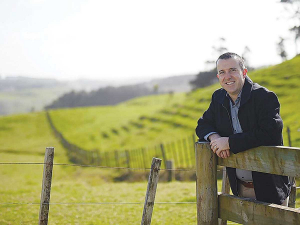Lower North Island farmers “cautiously optimistic” heading into winter – DairyNZ
Cautiously optimistic is how DairyNZ's regional manager for the lower North Island, Mark Laurence describes the mood of farmers in his patch.
 As countries gradually get on top of Covid and the global economy rebounds in the coming years, dairy demand will firm up, says Nathan Penny, Westpac.
As countries gradually get on top of Covid and the global economy rebounds in the coming years, dairy demand will firm up, says Nathan Penny, Westpac.
Demand for dairy will firm over the next two years as the global economy rebounds from Covid, says Westpac senior agri economist Nathan Penny.
He notes that the trend has already started in China and East Asia where demand has rebounded from its lows earlier in the year.
Westpac has announced a 2021-22 initial opening forecast of $7/kgMS. The forecast is equal to its forecast for 2020-21 and close to the $7.14/kgMS final price achieved in 2019-20.
“Our forecast is higher than the long-run average milk price, although the difference is smaller when the prices are adjusted for inflation,” says Penny.
A key change that Penny expects is that demand and prices for milk fat will begin to normalise.
Currently, milk fat prices are soft as consumers eat less cream and other milk fat products in settings such as restaurants.
“In particular, we expect that the rollout globally of Covid vaccines will gradually allow more people to return to restaurants and other venues that milk fat consumption relies on,” says Penny.
He expects moderate growth in the key exporting countries over the next two years.
“Over recent years, annual growth has averaged in the vicinity of 1%.
“This relatively modest growth is another reason why prices have held up well during the global Covid recession.
“Moreover, we see a low probability that global supply will deviate materially from these trends by enough to offset the impact on prices from rising demand.”
However, there are a few “forecast risks”, including the New Zealand dollar and the possibility that dairy buyers run down stocks after having built them up during Covid to protect against supply disruptions.
“We note that there is a risk that, if the New Zealand economy’s resilience continues to surprise and local interest rates rise, then the NZD/USD could rise beyond what we have assumed.
“In this event, the milk price would be lower.”
There is also uncertainty around global agricultural trade policy.
Penny says Joe Biden’s US presidency may take a more trade and China-friendly stance, thus allowing the US more access to China’s market and thus more competition for New Zealand dairy exports.
“Finally, we assume normal weather conditions going forward. In the case of a NZ drought, global dairy prices are likely rise.”
Managing director of Woolover Ltd, David Brown, has put a lot of effort into verifying what seems intuitive, that keeping newborn stock's core temperature stable pays dividends by helping them realise their full genetic potential.
Within the next 10 years, New Zealand agriculture will need to manage its largest-ever intergenerational transfer of wealth, conservatively valued at $150 billion in farming assets.
Boutique Waikato cheese producer Meyer Cheese is investing in a new $3.5 million facility, designed to boost capacity and enhance the company's sustainability credentials.
OPINION: The Government's decision to rule out changes to Fringe Benefit Tax (FBT) that would cost every farmer thousands of dollars annually, is sensible.
Compensation assistance for farmers impacted by Mycoplama bovis is being wound up.
Selecting the reverse gear quicker than a lovestruck boyfriend who has met the in-laws for the first time, the Coalition Government has confirmed that the proposal to amend Fringe Benefit Tax (FBT) charged against farm utes has been canned.